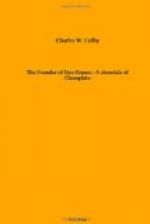For Hanotaux, [Footnote: Gabriel Hanotaux, member of the French Academy, is the author of the most authoritative work on the life and times of Richelieu.] Richelieu is ‘the true founder of our colonial empire,’ and La Ronciere adds: ‘Madagascar, Senegal, Guiana’ the Antilles, Acadia, and Canada—this, to be exact, was the colonial empire for which we were indebted to Richelieu.’ Regarding his breadth of outlook there can be no doubt, and in his Memoirs he left the oft-quoted phrase: ’No realm is so well situated as France to be mistress of the seas or so rich in all things needful.’ Desiring to strengthen maritime commerce and to hold distant possessions, he became convinced that the English and the Dutch had adopted the right policy. Strong trading companies—not weak ones—were what France needed.
Henry iv could have given the French a fair start, or even a lead, in the race for colonies. He missed this great opportunity; partly because he was preoccupied with the reorganization of France, and partly because Sully, his minister, had no enthusiasm for colonial ventures. Twenty years later the situation had changed. Richelieu, who was a man of wide outlook, was also compelled by the activity of England and Holland to give attention to the problem of a New France. The spirit of colonization was in the air, and Richelieu, with his genius for ideas, could not fail to see its importance or what would befall the laggards. His misfortune was that he lacked certain definite qualifications which a greater founder of colonies needed to possess. Marvellous in his grasp of diplomatic situations and in his handling of men, he had no talent whatever for the details of commerce. His fiscal regime, particularly after France engaged in her duel with the House of Hapsburg, was disorganized and intolerable. Nor did he recognize that, for the French, the desire to emigrate required even greater encouragement than the commercial instinct. He compelled his company to transport settlers, but the number was not large, and he kindled no popular enthusiasm for the cause of colonization. France had once led the crusade eastward. Under proper guidance she might easily have contributed more than she did to the exodus westward.
At any rate Richelieu, ’a man in the grand style, if ever man was,’ had decided that New France should no longer languish, and the Company of One Hundred Associates was the result. In 1627 he abolished the office of viceroy, deprived the De Caens of their charter, and prepared to make Canada a real colony. The basis of the plan was an association of one hundred members, each subscribing three thousand livres. Richelieu’s own name heads the list of members, followed by those of the minister of finance and the minister of marine. Most of the members resided in Paris, though the seaboard and the eastern provinces were also represented. Nobles, wealthy merchants, small traders, all figure in the list, and twelve titles of nobility were distributed




